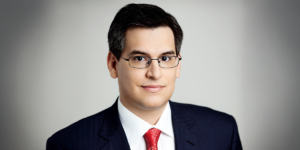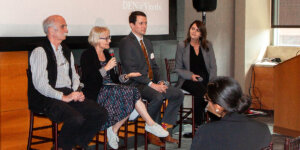
The Server Room Data Center at the Facebook headquarters. CREDIT: Facebook
Have you ever found yourself binge-watching an intense, immersive show on Netflix, only to be interrupted by buffering or delays in connection? What about a Facebook photo album that just won’t load no matter how many times you change your Wi-Fi settings?
One day, when all of that will be relegated to laughable history like the “can you hear me now” cell phone ad, you will thank people like Brandon Schlinker. He’s working to improve the Internet’s routing performance on major content providing sites like Netflix or Facebook.
Under the advisement of Professor Ethan Katz-Bassett, Schlinker, now a fifth year computer science Ph.D. student, earned a coveted Facebook Graduate Fellowship in 2016, making him one of only twelve out of hundreds of candidates to be selected, and granting him the ability to apply his talents to real world projects.
His focus is on the ongoing development of a software-defined internet traffic controller known as Edge Fabric.
Schlinker describes it as a faster way to connect users to rich content in peak demands. The system the Internet now relies on to do this, BGP (Border Gateway Protocol), is outdated but difficult to replace. BGP dates back to the early 90’s, when the Internet was still in its infancy. Its somewhat archaic structure is not able to identify the fastest pathways as the volume of content grows and content providers like Facebook run into capacity issues.
Schlinker and his team aim to make a system more conscious of these faster, more viable pathways, allowing end-users to access the content they want smoothly.
“Edge Fabric allows us to take in a lot of information that BGP doesn’t consider,” Schlinker said. “We override BGP, a simplistic decision-making process, with something more sophisticated.”
Like Waze for the Internet that constantly updates, Edge Fabric has built-in intelligence that makes it more aware of the possible pathways that could be used to get users content without degrading them or congesting interconnections where Facebook connects to user networks. It chooses which pathway can deliver traffic to users the best, effectively bypassing BGP.
Schlinker credits this success to Facebook’s open-minded approach to collaboration that leads to new breakthroughs.
“There is no line between research and production at Facebook,” Schlinker said. “Any idea that you come up with, you are encouraged to try it and bring it into the real world as opposed to first working on a prototype on a smaller scale.”
Facebook is always on the lookout for emerging talent coming out of USC Viterbi. In 2017, they found it in USC Viterbi graduate student, Yi-Ching Chiu, co-advised by Katz-Bassett and Professor Ramesh Govindan, the Northrop Grumman Chair in Electrical Engineering. Chiu was among the 40 finalists selected out of 800 Ph.D. applicants for the same Facebook Graduate Fellowship.
The fourth year computer science Ph.D. is also one of the brains behind Edge Fabric. While interning at Facebook this summer, Chiu teamed up with Schlinker, and together they worked hard to move the idea to practice.
These days, the USC-Facebook duo is hard at work to improve Edge Fabric’s system and to overcome its constraints. As they currently reside in different locations, they divide tasks and independently research solutions to real-time problems they encounter.
Chiu explains that in order to accurately review the results of their individual research, they must find the proper way to collect the data from research and incorporate it later. They also have to find what works best for Facebook, as it is very different from other networks.
“Because of the traffic volume, the inefficiency of BGP will be enlarged (if we do nothing), but it also means solving these problems could have an impact on many more people,” she said.
Although they face many challenges, their advisor Katz-Bassett instills faith in their success.
“Brandon, Yi-Ching, and I have been researching the challenges and possibilities of Internet routing for large content providers since they arrived at USC. They are very impressive junior researchers, and I’m very happy that Facebook recognized them in its fellowship program,” Katz-Bassett said.
Through more research and further iterations, Schlinker and Chiu will ensure that those addictive Facebook videos load without delay, making procrastination easier than ever before.
Published on February 23rd, 2018
Last updated on May 16th, 2024












